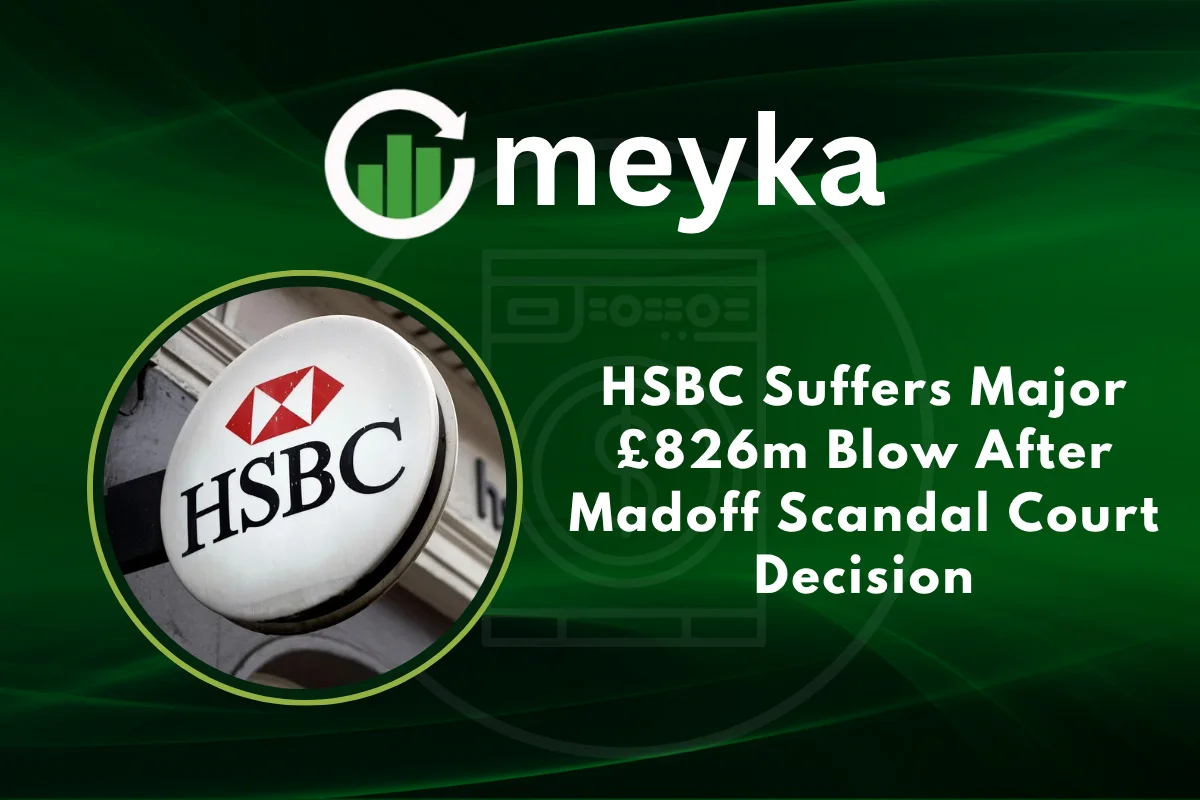HSBC Suffers Major £826m Blow After Madoff Scandal Court Decision
The global banking group HSBC Holdings plc (ticker: HSBC) has taken a significant financial hit following a court ruling tied to the infamous Bernard Madoff “Ponzi scheme” scandal. The legal blow comes after a long-running saga in which HSBC’s Luxembourg unit was accused of failing to protect investors in funds that placed money with Madoff’s firm. The bank will book a provision equivalent to about £826 million ($1.1 billion) in its upcoming results.
What happened: HSBC, the Madoff scandal and the court decision
The Madoff scandal erupted in December 2008 when Bernard Madoff admitted that his firm had been operating a massive Ponzi scheme, one of the largest in history. Several feeder funds and investors placed billions of dollars with his firm, trusting it to handle their assets. One such feeder fund is Herald Fund SPC, which invested in Madoff-linked assets and later sued HSBC’s Luxembourg entity for failing its custodial responsibilities.
In October 2025, a key court ruling by the Luxembourg Court of Cassation rejected part of HSBC’s appeal regarding securities restitution, ordering the bank to make a significant provision. HSBC said it would book a $1.1 billion charge (≈ £826 million) tied to this decision. The bank is now planning further appeals, but the decision is widely seen as a major reputational and financial event for HSBC.
HSBC stated that the ruling will hit its common equity Tier 1 (CET1) capital ratio by roughly 15 basis points (0.15%) in addition to other recently disclosed headwinds.
Why this matters: banks, liability and the stock market context
For banks like HSBC, legal liabilities linked to past scandals remain a risk. Heavy-duty oversight of custodial, administration and trust services is a must. The firm’s involvement in Madoff’s feeder fund litigation highlights that even years after the fraud was uncovered, the consequences ripple through.
From a stock market perspective, this event is important for several reasons:
- It affects HSBC’s financial strength and provisioning, which can impact investor sentiment and share price.
- It is another reminder that legacy issues can drag on a bank’s performance long after the headline crisis.
- For investors doing stock research, it emphasises that risk assessment must include legal, reputational and regulatory exposures, not just core business metrics.
- While HSBC is not an AI stock, the broader theme of risk management, technological oversight (e.g., monitoring transactions, fraud detection) and regulatory compliance links to how industry players may deploy tech and AI in the future to prevent similar issues.
Impact on HSBC’s financials and future outlook
HSBC’s announcement of the £826 million charge will weigh on its upcoming Q3 results. According to the bank, the hit is large but manageable given its size and earlier disclosures. Such a provision may reduce free cash flow, delay buybacks or impact dividend considerations.
For analysts and investors, here are key implications:
- Capital ratio erosion: Even a 0.15 % hit to CET1 capital is tangible in the banking landscape. It narrows the buffer that banks hold for stress scenarios.
- Reputation risk: HSBC’s image may suffer further; custodial services and fund-administration arms may face tighter scrutiny, higher costs, or client attrition.
- Litigation risk remains: This court decision may open or accelerate other claims tied to Madoff-era exposures. HSBC has noted that other cases are ongoing.
- Investor caution: Some investors may reassess HSBC’s risk/reward profile, especially if they expect more legacy costs. This could reduce appetite for bank stocks in some portfolios.
Broader lessons for investors and the financial industry
The HSBC-Madoff episode offers several takeaways relevant to all investors:
- Due diligence and oversight matter: The Madoff scandal was not just about a single fraud but also about how banks, funds and administrators handled risk. This remains critical in the age of complex financial products and AI-driven algorithms.
- Legacy exposures never vanish: Even though the fraud happened in 2008, the consequences persist nearly two decades later. For investors, this underscores that past problems can haunt companies.
- Non-operational risks matter: Legal, regulatory and reputational risks may not show up in revenue line items directly, but they can influence valuations, credit ratings and investor confidence.
- Tech/AI risk-management is crucial: As institutions deploy more AI and automated systems, they also expose themselves to new types of risk. While the bank here is not an AI stock per se, the theme of advanced risk controls is relevant across financial firms.
- Stock research must be holistic: Good stock research goes beyond P/E ratios or growth forecasts. It must incorporate litigation risk, governance, oversight and structural exposures. This holds especially in banking but applies in many sectors.
What this means for HSBC’s share price and investor sentiment
HSBC’s share price dipped following the announcement, reflecting investor concern. Although the bank said the impact is manageable, the event reminds markets that overlaying shocks can materialise, even in large, diversified banks.
For investors in HSBC or bank stocks more generally:
- They may choose to monitor legal provisions, capital buffers, buyback/dividend plans, and litigation pipelines.
- They may compare HSBC’s trajectory with peers to assess relative risk.
- They may look to banks that have fully cleaned up legacy issues or those with stronger risk governance.
- As part of a broader stock market strategy, investors may prefer companies with transparent disclosure, minimal surprise risk, and clean balance sheets over those still embroiled in historical cases.
Conclusion
The £826 million provision by HSBC tied to the Madoff scandal is a stark reminder that reputational and legal risks still loom large for financial institutions. Investors must continue to evaluate companies not just on growth numbers but also on governance, oversight and the potential for surprise liabilities. While HSBC has the size and resources to absorb this blow, the episode may prompt reassessment of the bank’s risk profile and investor approach.
For investors doing diligent stock research, this case highlights that past scandals can reverberate long into the future, and that risk management is as essential as growth potential. Banking, as ever, remains about more than just lending and deposits; it includes trust, transparency and resilience.
FAQs
The Madoff investment scandal involved Bernard Madoff’s massive Ponzi scheme, where clients were misled and billions were lost. HSBC is involved because its Luxembourg unit provided custodial or administrative services to funds that invested with Madoff. A court ruled that HSBC failed to uphold its duties in that role, leading to the recent provision.
Possibly. While HSBC has booked the £826 million charge (≈ $1.1 billion), the bank is still appealing and other claims remain. The final cost may differ, and investors should watch for updates.
Investors should monitor HSBC’s disclosures, capital ratios, litigation updates and dividend policy. They should also reassess risk exposures in bank stocks generally. Conducting detailed stock research, including governance and legal risks, is recommended before deciding.
Disclaimer:
The content shared by Meyka AI PTY LTD is solely for research and informational purposes. Meyka is not a financial advisory service, and the information provided should not be considered investment or trading advice.






